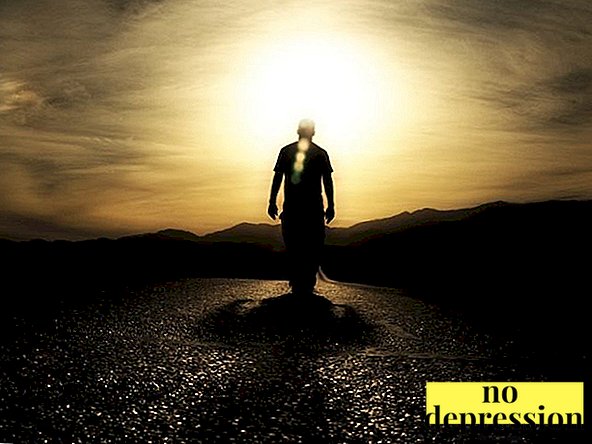Alcohol addiction gradually leads to serious mental disorders at the patient.
The symptomatology of a pathological condition depends on the type of alcoholic psychosis
.
Mental disorders in alcoholics

A person with alcohol addiction begins to develop serious problems as his alcohol consumption increases. mental problems.
Mental disorders are pathological disorders of the thinking process, mood and behavior that go beyond the generally accepted norms.
In the presence of such disorders a person ceases to function fully perform their duties and roles in society. Gradually, he loses his social position and eventually his personality completely degrades.
Mental disorders develop in alcoholics according to different scenarios. The process does not depend on the age of men and women.
The occurrence of such problems leads to symptoms of different directions:
- physical;
- emotional;
- cognitive (brain function, cognition);
- behavioral;
- perceptual (objective perception of reality through the senses).
There are different types of psychosis. Each of them has its own specifics.
Alcoholic psychopathy
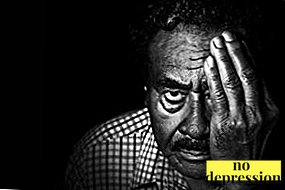
This is a syndrome that manifests itself as a combination of such pathological states as deceit, self-centeredness, shallowness of emotional experiences, heartlessness, etc.
From a scientific point of view, psychopathies are not considered as a manifestation of mental illness, but as feature of the nature of the individual.
Under the influence of alcohol separate negative traits sharpen and develop into pathological conditions.
Basically, from the point of view of the manifestation of psychopathic character traits, the division of alcoholics into inhibited and excitable personalities is applied. In the first case, closure, asthenia. In the second case, there is excessive excitability, hysteria, instability of behavior.
The main problem that causes such states to occur is violation of the emotional-volitional sphere. As alcohol dependence progresses, psychopathic traits worsen.
Thus, in individuals with paranoiac psychopathy, there is an excessive suspicion, dullness, distrust and pedantry. Hysterical psychopaths seek by any means to draw the attention of others to their person. They want to be always in the middle of the action.
Metal psychosis
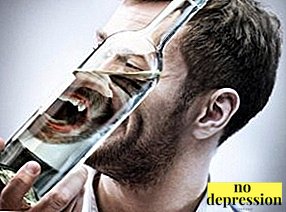
This is an acute, prolonged mental disorder of the patient, wearing chronic.
Such disorders are usually diagnosed in stages 2, 4 of alcohol dependence.
Exist various types of psychotic data:
- delirium tremens;
- pathological intoxication;
- alcohol paranoid;
- hallucinosis.
Each of them has its own symptoms and its own course. Allot three types of psychosisdiffering in duration:
- Acute. Occurs in the overwhelming number of cases. The maximum duration can be a month, the minimum - a few days. For a complete exit from this state, timely appeal for help is necessary.
The probability of recovery directly depends on the condition of the person, his desire to recover, on the quality of the treatment provided.
- Subacute. As a rule, it manifests itself in the form of alcoholic paranoid. Lasts significantly longer than the previous species - about 2-3 months. In some cases, complications may appear, residual effects persist, and a chronic form may be formed.
- Chronic. This type of disease continues for a very long time - more than 5 years. The patient is constantly experiencing mental disorders. The condition of such a person gradually becomes worse.
Post-alcoholic psychosis

In other words - “delirium tremens”, “squirrel”.
Provoked by a sharp rejection of spirits. Delirium tremens observed in chronic alcoholics during their breakout.
In some cases, the appearance of the disorder may be the result of taking large doses. substandard drinks, surrogates.
Blue Devils is a significant danger to the life of the patient. This disorder is treated in the hospital (substance abuse, psychiatric).
Typical symptoms for which a close alcoholic can recognize the delirium tremens:
- disgust for alcohol;
- mood swings;
- hallucinations (verbal, tactile, auditory);
- sleep disturbances (insomnia, nightmares);
- pressure increase;
- temperature rise;
- tremor of the limbs or the whole body;
- confusion
The reasons
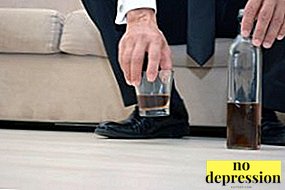
People with addiction develop psychosis. in the second, third stage diseases.
This is due to general intoxication of the body, metabolic disorders, immune disorders, disorders of the nervous system.
As a result of prolonged use of alcohol by a person, all internal organs, the nervous system are damaged, which Immediately affects mental processes.
Psychopathic conditions usually manifest after long hard drinkingat the end of a long binge. Exhaustion of the body, comorbid diseases or injuries, acute poisoning - all this provokes mental problems.
Symptoms and course
The course of psychosis depends on its type, on the duration of alcoholism, on the age and state of health of the patient. The final result, in turn, depends on degree of damage to the nervous system, from the level of metabolic disorders.
Get rid of the alcoholic from psychosis at home is impossible. Treatment occurs only in the hospital.
Joint efforts are often required. different specialists: psychiatrist, narcologist, neurologist, endocrinologist, etc.
Symptoms of alcoholic psychosis can be seen in examples of its most typical forms.
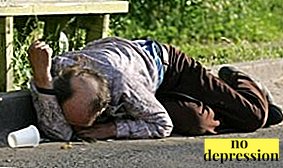
So for hallucinosis The following features are characteristic:
- verbal, tactile, auditory illusions;
- conversations with "voices";
- persecution mania;
- reduced physical activity;
- anxiety;
- irritability.
This form of disorder is the most dangerous for others and for the person himself.
Under the influence of visions, he can show physical aggression towards other people, which is fraught with fatal consequences.
Symptoms of delusional states (paranoid):
- demonstration of emotions generated by imaginary scenarios of persecution, violence, murder, etc.
- excited state;
- temperature rise;
- headaches;
- sleep problems (often dreadful dreams).
With this form of psychosis, the patient may demonstrate aggression, increased irritability, gloominess. The consequences of such behavior may also be serious enough.
Signs of pathological intoxication:
- impulsiveness and stereotyped behavior;
- avoiding contact with other people;
- demonstration of delusions;
- illusory experiences;
- demonstration of purposeful, confident behavior without visible signs of intoxication.
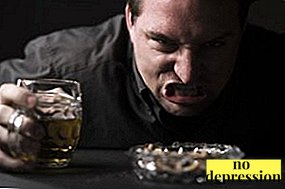
At the end of this state, there is a pronounced psychophysical exhaustion.
Consequences and prognosis
The state of psychosis leads to serious health problems. The following systems and organs are affected:
- central nervous system;
- brain;
- liver;
- a heart;
- stomach;
- intestines.
The main blow takes the liver. Constant intake of large amounts of toxins, ethanol leads to a serious organ damage.
As a result, cirrhosis or even coma develops. Liver coma is complete organ failure. Timely treatment and elimination of alcohol can significantly prolong the functioning of the liver.

The condition of the heart muscle is also worsening, which may end up with coronary artery disease, hypertension.
Intoxication of the body develops into stomach problems. As a result, patients are often diagnosed with peptic ulcers, pancreatitis.
The pronounced loss by a person of intellectual abilities becomes a clear consequence of the state of psychosis.
He has difficulty mastering information, concentrating, memory deteriorates. In the end, he forgets the elementary things getting dumberthan it was before.
This leads to problems not only in everyday life, but also to obvious professional degradation. Respectively, deteriorating social situation.
Alcoholics, as a matter of fact, become outcasts, since the expressed mental disorders prevent them from adhering to the norms of behavior that exist in society, maintaining normal social connections and carrying out professional activities.
In the end, an alcoholic with a mental disorder can only rely on communication with loved ones (if they remain with him) and drinking companions.
Treatment
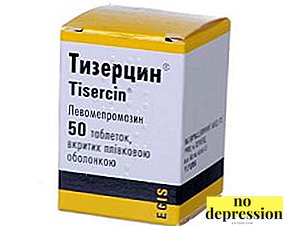
Treatment implies hospitalization.
In this state, a person can harm both himself and his loved ones.
At the first symptoms of psychopathic conditions need to ask for help.
Success can be achieved only if during treatment there will be a complete rejection of alcohol.
During therapy, the following psychotropic drugs are usually used: Ami-nazin, Tizertsin, Chlorprothixen, Thioridazin, Haloperidol.
The body of a victim of addiction does not receive important vitamins and nutrients, since food is forced out of the diet by alcohol. For this reason, appointed vitamins. First of all, these are vitamins of group B - Aerovit, Complivit, Centrum.
Depending on the severity of the course of the disease and the form of the disorder, other methods of treatment can be used: detoxification therapy, plasma exchange, psychopharmacotherapy, etc.
In chronic alcoholism the emergence of mental disorders is inevitable. Each form of psychosis has its typical manifestations. Timely medical intervention can help a person get out of this condition.
Acute alcoholic psychosis:


